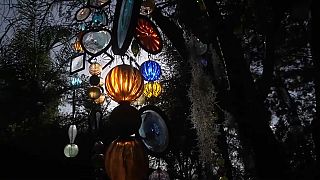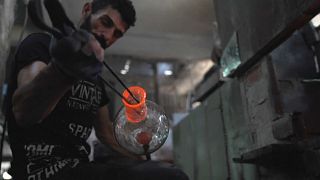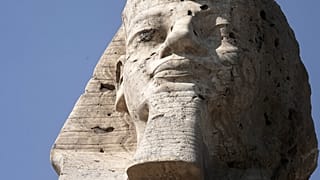Egypt
Seated in front of a 1200-degree stone stove, Mahmoud Ahmed shapes molten glass into cups and plates at his father's workshop in Cairo.
The challenging and traditional occupation is often passed down through generations. That's the case for the Ahmed family.
"This is an inherited occupation; it's a traditional one. It's tough as I work in front of a 1200-degree stove, not everyone can endure this. Fortunately, I've imparted this craft to my sons, and they are carrying it forward. It was originally my father's profession."
Glass was first made in the ancient world. Egyptian glass beads are the earliest glass objects known, dating from about 2500 BC.
Passing on the craft is also a matter of survival for Khaled Ahmed.
"It's how I make a living, how can I stop? If I stop for a day, I won't be able to provide the next day. It's my job."
The technique has remained relatively the same since Syrian craftsmen invented glassblowing in the 1st century BC. The molten glass is gathered on the end of a blowpipe, inflated to a bubble, and formed into a vessel by blowing, swinging, or rolling on a smooth stone or iron surface.
The oven, a fiery pit, is where the magic happens.
"As for the heat, I'm constantly in motion, with my arms and muscles working alongside the blowpipe. The blowing process itself requires extra effort, and sitting in front of such high temperatures affects my eyesight. All of these are challenges."
In Cairo's Egypt’s City of the Dead some workshops recycle material and create glass objects from it.













02:19
Turkey: archaeologists uncover ancient Jesus fresco in tomb
01:49
UN sounds alarm on funding cuts for Egypt’s vulnerable
01:16
Moroccan caftan joins UNESCO Intangible Cultural Heritage List
00:49
French footballer Paul Pogba announces investment in camel-racing team
01:00
Bulgarian glass ornaments by disabled artists are winning hearts
02:20
In Trinidad and Tobago, a new generation embraces the sound of the steelpan